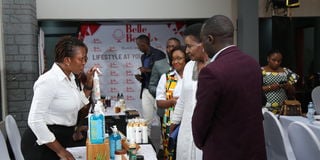Prime
Belle Beauty: A story of seizing hard times to find opportunities

An exhibitor shows Amelia Kyambadde (C), some of the beauty products that are listed on the Bella Beauty App. Photo/ Justus Lyattu
What you need to know:
- When Covid-19 almost put the world on its knees, Alice Sharon Namugerwa identified a deficiency and dared to dream where others had thrown in the towel.
The story of Alice Sharon Namugerwa is a story of finding an opportunity where many see none.
When Covid-19 almost put the world on its knees in the later months of 2020, Uganda was not spared.
Life in general, just like in many other countries, was devastatingly frustrating, characterised by prolonged lockdowns and restrictions on movement.
Many folded their hands, threw hands in the air and gave up on life, while others such as Namugerwa dared to gather themselves to find opportunities in a sea of deficiencies that largely lacked solutions.
Covid-19 at the time had disrupted the lifestyle and beauty industry. Simple things such as hair repair, manicure or pedicure, were extremely scarce. And this is where Namugerwa saw an opportunity.
“It was a difficult period, but I saw an opportunity to start Belle Beauty,” the founder and chief executive officer of Bella Beauty Basics, says.
Initially, Namugerwa says, the plan was to link beauty service providers with customers.
However, with movement restricted, she had to think hard and that is when the idea of developing a digital channel, where service providers and customers would meet virtually.
Thus, she had to visualise a plan but to actualise it, she needed people who were not only technical, but would be able to develop a digital and financial inclusion platform accessible through web and app formats.
“I was stuck, but not down. That is when I learnt about the 2021 HiPipo Women in Fintech Hackathon,” she says, detailing how the initiative, which gives women a chance to innovate and develop digital and financial inclusion products, saved her idea from being shelved.
In 2021, Namugerwa registered the Belle Beauty Team in the HiPipo Women in Fintech Hackathon, which had over 20 innovation teams, waiting to grab the opportunity.
By the end of the hackathon, Namugerwa and her team had developed a minimum viable product (MVP) that was ready to be taken to the market.
“The hackathon literally made our product market ready,” she says, but notes that there were challenges that needed to be addressed first for the product to function properly.
Thus, since 2021, Belle Beauty has undergone several changes, which have seen it upgrade from just being a beauty platform to now becoming a super lifestyle app that was officially launched in Kampala last week.
Belle Beauty is an e-commerce platform that was initially created as a beauty solution platform but has transitioned into selling beauty products, ticketing for events, and offering beauty services.
“Customers can use the app to order for a product listed on the platform. A supplier will take up the order and delivers the products through our office to the customer,” Namugerwa says.
The app also allows a customer to select a service provider, who then receives the order and meets up with the client to complete the transaction .
Payments are done digitally through an automated system that uses both bank cards and mobile money.
The Belle Beauty App is downloadable on both Google Play and Apple Store and has more than 100 beauty service providers and about 50 beauty products makers, majority of whom vend purely organic products made in Uganda.
Belle Beauty joins a league of a growing e-commerce market that is largely dominated by global players such as Jumia and Glovo.
E-commerce is slowly becoming a household service with data from ECDB showing that Uganda’s e-commerce sector continues to grow steadily with revenues of about $123m earned in 2023, and is projected to grow by an average of 5.6 percent per annum in the next four years.
Electronics remain the largest traded products in Uganda’s e-commerce market, accounting for about 25.3 percent of the total revenues, followed by hobby and leisure with 22.9 per cent. Fashion accounts for 18.9 percent, furniture and home-ware (11.2 percent), while care products and grocery and others account for 8.2 percent and 6.2 percent, respectively.
During the launch of the app in Kampala, Amelia Kyambadde, a senior Presidential Advisor on Industry, said innovations such as Belle Beauty are a true testament to what Ugandans can do.
Many youth, she said, have pushed Uganda’s digital transformation agenda, but must be supported to fully exploit the potential that lies in technology and its ability to transform the economy.
“Youth have been aggressive in creating opportunities and innovating products that can transform our economy. Their efforts must be supported,” Kyambadde said.
Competing in the e-commerce space Since 2021, the Belle Beauty App has gone through various changes that seek to make it user friendly.
The App has been fine-tuned with the support of the HiPipo Women in Fintech Hackathon, which, Innocent Kawooya, the HiPipo chief executive officer, says gives innovators an opportunity to innovate products that can favourably compete in the e-commerce space. “E-commerce is the new way of doing business,” he says, but cautions that for Uganda to fully exploit the benefits of e-commerce, government must ungently democratise access to Internet, reduce charges levied on Fintechs and improve location making.




